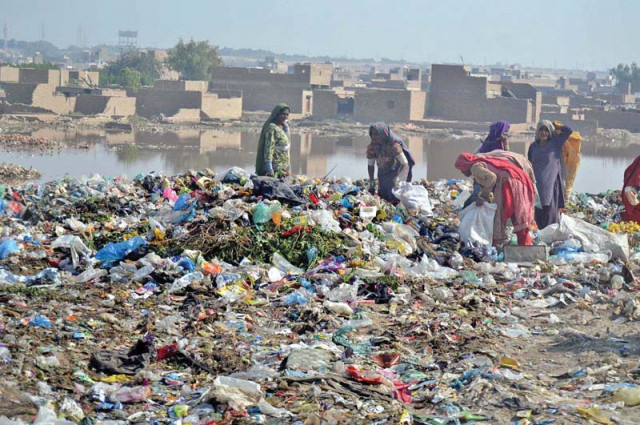Environmental pollution: Commissioner halts SEPA action against industries
Chemical analysis of waste of each industry to precede action by environmental watchdog

Untreated waste water from SITE is dumped in the Phuleli canal, which supplies drinking and irrigation water to three districts. PHOTO: FILE
The meeting, however, concluded with Hyderabad commissioner Qazi Shahid Pervez staying action by the Sindh Environment Protection Agency (Sepa) against industries violating environmental laws. "All factories [in Hyderabad SITE area] sealed by Sepa will be reopened [without submission of an undertaking]," announced the commissioner in a press statement.
The agency puts the figure of operating industries at over 300, but SITE Association of Industries claims only 175 units are working.
Besides air pollution and dumping of untreated solid waste, untreated waste water from SITE is dumped in the Phuleli canal, which supplies drinking and irrigation water to three districts. To curb this practice, Sepa issued notices and environment protection orders (EPOs) last month to many factories, asking them to submit an undertaking for installation of in-house treatment plants. However, the commissioner declared that although the notices will remain in place, Sepa will not take further action.
Pervez also formed a committee and tasked it with collecting waste samples released from each industrial unit for laboratory analysis. The exercise is stipulated to be completed in two months, after which all industries will be asked to submit undertakings for setting up in-house treatment plants within three to eight months.
"The question is whether we will be able to complete the task in the given time limit," said an official in the six-member committee.
Referring to a similar activity ordered by the former commissioner on December 7, 2015 to survey SITE industries for in-house treatment systems, he said, "That exercise was far less time consuming as it required just physical inspection rather than collecting samples. But it actually took us longer than two months to finish the survey," said the official, who requested anonymity.
SEPA's regional director, Munir Abbassi, who is spearheading the campaign, sounded dismayed over the commissioner's decision. "Sepa is an independent organisation. The Sindh Environment Protection Act, 2014, at no place provides for staying action after issuing the EPO," he said. "The industries have continued to buy time for the last several years."
He said samples will be sent for tests in Sepa-certified laboratories. "Meanwhile, we may send some cases against industries given EPOs to the environmental tribunal on the basis of non-compliance," he explained.
Dr Ahsan Siddiqui, an independent expert who is the committee's focal person, believed the decision is justified. "We need to tell each industry what sort of toxins they are releasing. On the basis of analysis, we will also be able to tell them which industry requires installation of what kind of treatment systems," he told The Express Tribune.
"There are 120 industries that process different types of daal [lentils]. All of them use a harmful chemical to colour and polish their produce," he explained. "If they can be stopped from using this chemical they may not need a treatment facility, which they will have to install now," justified Dr Siddiqui.
Published in The Express Tribune, February 29th, 2016.



















COMMENTS
Comments are moderated and generally will be posted if they are on-topic and not abusive.
For more information, please see our Comments FAQ